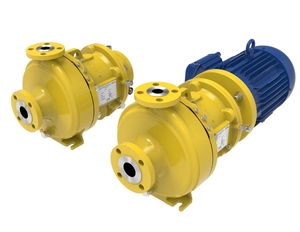

|
Edward Lowton
Editor |


|
| Home> | Plant, Process & Control | >Pumps | >Sealless pump survey: interim results |
Sealless pump survey: interim results
21 March 2022
Your input is valuable in helping us understand how magnetic drive pump technologies are perceived in the market place, says Hannah Verrall

WHILE PRELIMINARY results of our survey are reported here, we would like to cast the net further and wider to make the data even more reliable. So we have kept the survey active and encourage you to participate (enter before April for a chance to win a prize) by visiting the URL at the foot of this page.
As a specialist in sealless pumps, HMD Kontro is dedicated to encouraging the take-up of this now well-established technology, which has been shown to minimise safety risks through total fluid containment, while offering cost benefits for processes and fluid transfers. The company recently stepped up its Think Sealless programme, with a dedicated website section, which provides learning resources to help build awareness of magnetic drive sealless pumps and guide specifiers less familiar with the technology to determine the best fit for their fluid transfer requirements.
A further step in the Think Sealless campaign, HMD Kontro’s current Sealless Survey is aimed at assessing the level of awareness and use of magnetic drive sealless pumps to further determine how best the company can support both users and newcomers to the technology.
Do specifiers understand the benefits?
The purpose of the survey is two-fold. Firstly, to gather information on operator experience with sealless pumps and to understand how the advantages of magnetic drive pump technology are perceived within the wider marketplace. Secondly, to find out to what extent specifiers and users prioritise or understand the benefits of sealless technology over sealed pump alternatives.
Interim results reveal that the key areas where sealless pumps are most likely to be specified is for chemicals (87% of respondents) and industrial applications (46% of respondents). Collectively 52% of respondents would also consider sealless pumps for upstream or downstream oil and gas processes.
Unsurprisingly, given these applications, when asked which attributes specifiers consider the most important, safety tops the list, closely followed by environmental concerns.
For complex operations involving the transfer of highly toxic or corrosive materials, managing risk is an exceptionally important issue, with substances likely to harm plant employees or cause environmental damage if released. With the increasing stringency of environmental legislation and a tightening of international safety standards, breaches can also result in an issue with legal compliance.
Safety with hot, corrosive or poisonous fluids
Process operators highlighted a range of fluids where safety is an issue, including hot fluids or high temperature processes and acids - ranging from mildly acidic to sulphuric acid and HF acid – also hydrocarbons. Confidence too, was seen as a major factor, in respect of assuring zero leaks and preventing failures or breakdowns.
Mechanical seal pumps were identified as a prime source of leakage by survey participants. Additionally, with no need for seal support systems and reduced instrument wiring and configuration requirements, the magnetic drive design is easier to install and maintain, an important consideration for specifiers, with reliability and low maintenance on the list of attributes recognised as key by early survey respondents.
The latest sealless pumps, for example HMD Kontro’s CSA/CSI range of pumps, are based on a new modular concept, standardising the range and streamlining the selection process. With greater interchangeability of parts, production downtime for servicing is minimised and pump life extended, also seen as important by specifiers, resulting in ongoing cost savings, making magnetic drive sealless pumps an attractive option when measured in whole life terms.
Providing added peace of mind, pump manufacturers like HMD Kontro also offer a solution to more recent regulations, which require the option of a secondary control or containment system. Compliance can easily be achieved with the inclusion of a leakage restriction / containing device on the motor shaft (close coupled) or drive shaft (long coupled). Increasingly new specifiers are opting to include these systems.
Hannah Verrall, is global product line manager, HMD Kontro Sealless Pumps
- No related articles listed


















